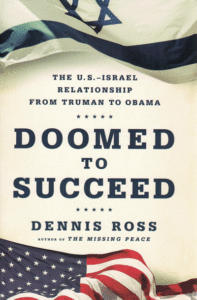Doomed to Succeed: The U.S.-Israel Relationship from Truman to Obama, by Dennis Ross, Farrar, Straus and Giroux, 474 pages, $30
Reviewed by NEAL GENDLER
Believe it or don’t — and many won’t — but Dennis Ross, at the center of Mideast policymaking for 30 years, is convinced that President Barack Obama is committed to the security of Israel.
In his new book, Doomed to Succeed, Ross doesn’t gloss over Obama’s missteps, starting with the 2009 speech in Cairo, which, among other things, notoriously related Israel’s founding to the Shoah, not to Jews’ two-millennia longing to return to their homeland.
Ross was a Middle East specialist on President Ronald Reagan’s National Security Council; State Department policy planning director for President George H.W. Bush (Bush 41); Middle East peace envoy for President Bill Clinton; and a special assistant to Obama, whose national security priorities, Ross says, “almost guaranteed that Israel would be a problem.”
But in discussions with Obama, “I had no doubt that he was genuinely committed to Israeli security,” Ross says.

Not all presidents were equally so. Doomed has its positive, negative and naïve actors. Generally, the good guys understood Israel and the Middle East; the less-good, in Ross’s view, did not. The former include Presidents Truman, Johnson, Reagan (and his secretary of state, George Schultz), Clinton and George W. Bush, and Obama National Security Adviser Tom Donilan.
The negative include top Truman advisers and Secretary of State George Marshall; President Eisenhower and his secretary of state, John Foster Dulles; and Donilan’s successor, Susan Rice.
Obama might be among the naïve, at least in his administration’s early years.
“Johnson, like Truman, was a friend of Israel,” but in 1967 felt unable to act on Eisenhower’s promises, including keeping open the Straits of Tiran, “and largely failed the Israelis at a critical moment.” President Nixon viewed the Middle East through Cold War eyes, promised arms and sent desperately needed F-4s and supplies during 1973’s Yom Kippur War. Bush 41 had no Reagan-like emotional attachment to Israel, but called U.S. commitment to Israel “unshakable.”
Ross gives each president a chapter, providing an insider’s history and analysis, including discussions during top-level meetings. Throughout are two related themes: One is the cool-or-warm division, and the other is Ross’ two relationship models, competitive and cooperative. The first tends to see Israel as a competitor with Arabs for U.S. favor. The cooperative approach sees Israel as a fellow democracy — unique in its region — and a natural, if unofficial, ally.
President John F. Kennedy broke the taboo on providing advanced arms to Israel — with Hawk anti-aircraft missiles — and told Prime Minister Golda Meir that the United States had a “special relationship with Israel.” But only after the Yom Kippur War did the United States become Israel’s main source of economic and military assistance, Ross says, and “only during the 1980s and the Reagan administration was Israel finally considered a strategic asset and treated as an ally and a partner.”
Ross finds “a remarkable continuity — not of policy, but of arguments… recycled concerns that too close a relationship with Israel will harm our ties to the Arabs and damage our position in the region.” But it doesn’t. “Courting the Arabs through pressuring Israel bought us nothing,” a lesson he finds unlearned.
Israel’s failings also get attention, including building over the “green line” and not seizing Egyptian President Anwar Sadat’s 1971 willingness to give peace to get Sinai.
This is a very readable but serious book, with 65 pages of notes, acknowledgements and index. Ross writes clearly and engagingly; you want to keep going. Large pages of somewhat smallish type are packed with quotes and details; reading isn’t a burden, but it’s not quick.
Serious people — those really interested in U.S. relations with Israel, and those puzzled by U.S. policies and sometimes one-sided criticism of Israel — should find it very worth the time. Especially good is Ross’s explanation of diplomacy — or lack of it — leading to the 1967 Six Day War.
The title is borrowed from a friend and policy-planning colleague, the late Harvey Sicherman, who’d say that on some issues, they were “doomed to succeed.”
***
Neal Gendler is a Minneapolis writer and editor.
(American Jewish World, 10.23.15)



















